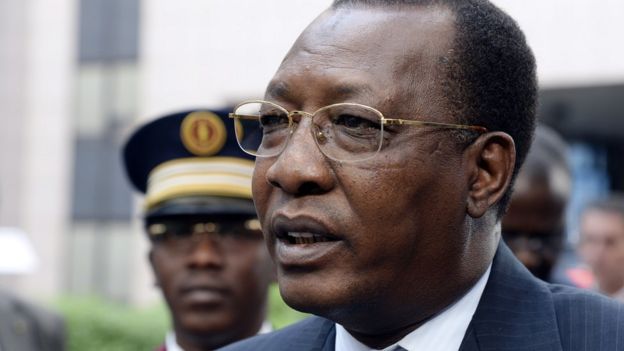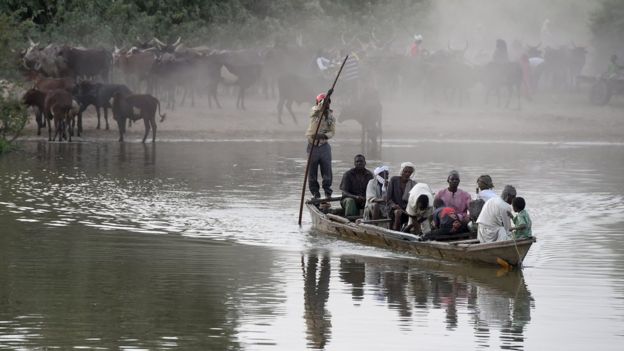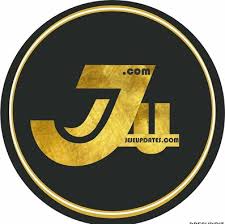Chad’s President Idriss Deby has been sworn in for a fifth term. An opposition coalition had called for people to stay at home, describing it as a national day of mourning.
It does not recognise the election result, saying the poll was rigged.
Mr Deby seized power in 1990 and has been in office ever since.
His swearing in ceremony was attended by several African presidents and the French defence minister.
Mr Deby has been able to obtain foreign support by presenting himself as a force for stability in the region.

Chad country profile
A largely semi-desert country, Chad is rich in gold and uranium and stands to benefit from its recently-acquired status as an oil-exporting state.
Chad’s post-independence history has been marked by instability and violence, stemming mostly from tension between the mainly Arab-Muslim north and the predominantly Christian and animist south.
Chad became an oil-producing nation in 2003, with the completion of a $4bn pipeline linking its oilfields to terminals on the Atlantic coast.
However, Africa’s fifth-largest nation suffers from inadequate infrastructure, and internal conflict. Poverty is rife, and health and social conditions compare unfavourably with those elsewhere in the region.
FACTS
The Republic of Chad
Capital: N’Djamena
- Population 11.8 million
- Area 1.28 million sq km (495,800 sq miles)
- Major languages French, Arabic
- Major religions Islam, Christianity
- Life expectancy 49 years (men), 52 years (women)
- Currency CFA (Communaute Financiere Africaine) franc
LEADER
President: Idriss Deby
 Image copyrightGETTY IMAGES
Image copyrightGETTY IMAGESIdriss Deby came to power in 1990 after toppling Chadian President Hissene Habre – with the help of the French secret service.
A shrewd tactician, Mr Deby had been President Habre’s chief-of-staff, leading a series of victories over rebel forces in the 1980s and earning a reputation for courage and military prowess.
After six years in office, he set up Chad’s first multi-party political system and won elections that year.
But Mr Deby appeared to have little genuine domestic support. Critics say his single biggest failure was putting his clan before his country.
He is also thought to have health problems and has been known to fly to Paris for treatment to his liver.
He gained a fifth term in elections in April 2016.
MEDIA
 Image copyrightGETTY IMAGES
Image copyrightGETTY IMAGESRadio is the main medium, but state control of many broadcasting outlets allows few dissenting views.
The only television station, Tele-Tchad, is state-owned and its coverage favours the government.
Reporters Without Borders has on several occasions condemned the arrest of journalists in Chad, including the publisher of an privately-owned newspaper in October 2015.
TIMELINE
Some key dates in Chad’s history:
1883-93 – Sudanese adventurer Rabih al-Zubayr conquers the kingdoms of Ouadai, Baguirmi and Kanem-Bornu, situated in what is now Chad.
1900 – France defeats al-Zubayr’s army, completing its conquest in 1913. Chad becomes a colony.
1960 – Chad becomes independent with a southern Christian, Francois – later Ngarta – Tombalbaye, as president.
1963 – The banning of political parties triggers violent opposition in the Muslim north, led by the Chadian National Liberation Front, or Frolinat; three years later this revolt develops into a fully-fledged guerrilla war.
1973 – French troops help put down a revolt in the Muslim north.
1977 – Libya annexes the northern Chadian Aouzou strip, and sends in troops in 1980 to support President Goukouni Oueddei.
1990 – Coup leader Hissene Habre toppled by former ally, Idriss Deby.
2011 – Presidential election, boycotted by opposition. President Idriss Deby is declared winner.
2016 – Ex-ruler Hissene Habre is convicted of crimes against humanity and sentenced to life in prison at a landmark trial in Senegal.









